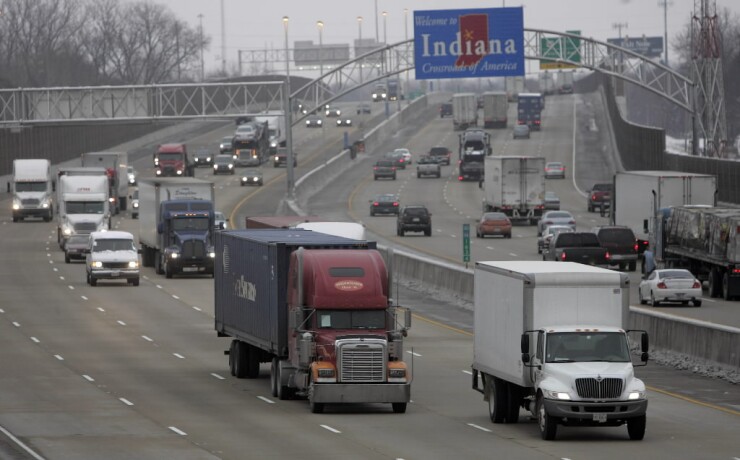DALLAS -- Indiana can seek permission from federal regulators to toll its interstate highways with the passage of a transportation funding measure by lawmakers as part of a budget accord with Gov. Eric Holcomb.
House Bill 1002, which sailed through the state House and Senate on Friday, also will raise the state’s gasoline and diesel taxes by 10 cents per gallon and index them to inflation. It will phase out the diversion of the state sales tax on gasoline, and increase other road fees.
The funding measure is expected to bring in $870 million per year of new money for the state and $340 million per year for local roads when fully implemented by 2024.
The higher taxes and fees will bring in $357 million for state roads and $260 million for local roads in fiscal 2018.

But the biggest long-term impact of the funding measure could be its provision authorizing the Indiana Department of Transportation to seek a waiver from federal regulators so it can levy tolls on interstate highways within the state.
If permission is granted, the governor could levy the tolls without action by the General Assembly. The joint State Budget Committee would have to sign off on the tolling plan.
The interstate tolling study required by the funding measure could cost as much as $500,000, according to state legislative auditors.
House Speaker Brian Bosma, a Republican from Indianapolis who backed the funding plan, said interstate tolling is a revenue source that cannot be ignored.
State and local roads need an additional $1 billion to $1.2 billion of new funding per year for the next 20 years for proper maintenance, he said.
Tolling has to be a part of Indiana’s transportation funding, Bosma said.
“We don’t know the form it’s going to take,” he said. “It could be tolling for truck lanes. It could be tolling for new lanes.”
Motorists will see projects funded by the new law get underway soon, Bosma said.
“We want them to start smelling asphalt in July,” he said.
Interstate tolling would bring $1 billion a year of needed revenue and provide long-term sustainable funding for Indiana’s transportation network, said Steve Davidson, director of the transportation group at the Indianapolis engineering firm American Structurepoint.
A realistic toll rate would be 5 cents per mile for passenger vehicles and 15 cents per mile for commercial trucks, he said.
“This is a conservative estimate,” Davidson said. “Over 25% of the traffic on Indiana roads are from out of state, and those people don’t necessarily purchase fuel here to fund Indiana roads.”
Federal law bans most forms of interstate highway tolling, said Robert Poole, director of transportation policy at the Reason Foundation.
There are two slots available in a federal pilot program that would allow three states to rebuild an interstate highway using bonds backed by toll revenue, he said.
States can also toll new lanes designed to reduce congestion on existing highways.
The best approach for Indiana would be to dedicate new tolls strictly to projects on the interstate highways and limit current state and federal funding to other roads in the network, Poole said.
“Motorists and truckers would fight hard against any actual plan that implemented tolling as a cash cow -- if that were legal,” he said.
A value-added tolling plan that limits the use of the revenues would avoid charges of double taxation, Poole said.
“This is easy to do with electronic toll collection, and would be revenue-positive for the state, since the per-mile toll would be higher than the per-mile yield of the state gas tax,” he said.





